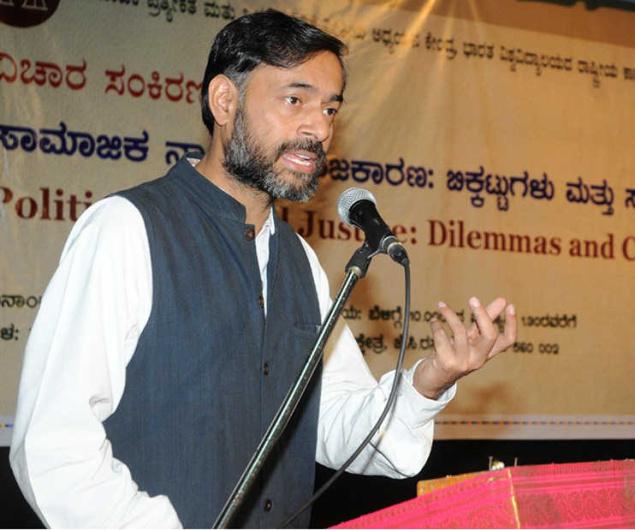 NEW DELHI, September 12; Claiming that he had “done no wrong, concealed nothing, not violated any of the norms and values he upholds,” psephologist Yogendra Yadav has said it is curious that the government acted to remove him as UGC member because of his affiliation to a party, while ignoring the case of 100 MPs who own or run higher educational institutions in a “brazen conflict of interest.”
NEW DELHI, September 12; Claiming that he had “done no wrong, concealed nothing, not violated any of the norms and values he upholds,” psephologist Yogendra Yadav has said it is curious that the government acted to remove him as UGC member because of his affiliation to a party, while ignoring the case of 100 MPs who own or run higher educational institutions in a “brazen conflict of interest.”
“The media often connects their vested interests with the non-passage of any [piece of] effective and meaningful legislation that regulates these private institutions. I do not know if your government is contemplating any action to curb this blatant conflict of interest,” he has said in response to the show-cause served on him by the Ministry of Human Resource Development, which said his “antecedents and credentials” altered after he had joined the Aam Aadmi Party.
“Many courageous whistle-blowers have brought out other instances of conflict of interest in many institutions of higher education, including the Indian Institutes of Technology. Closer home, your Ministry had nominated a number of persons who own or run private universities and other private institutions as members of the UGC itself. One of them continues to be a member,” Prof. Yadav has argued, adding he does not wish to recount tales of the deemed university scandal that rocked the UGC as a result of these nominations.
It may look rather odd that a government that did nothing to prevent, and actually perpetuated, this brazen conflict of interest has found it out in a decidedly less obvious case. “Someone might wonder if your government would have acted with similar zeal if I had joined the Congress or has done so with similarly placed functionaries who have joined the ruling party,” he said in his reply to Minister M.M. Pallam Raju.
Prof. Yadav said he could have ignored the notice but decided to reply because “I cherish the autonomy of institutions like the UGC…, even if it is notional.”
Prof. Yadav pointed out that Acharya Narendra Deva, a renowned scholar of Buddhism and national president of the Socialist Party, which was the leading Opposition of the day, was appointed as Vice-Chancellor of two universities consecutively. “From what I know, Jawaharlal Nehru was instrumental in persuading Acharyaji to take up this position. Party politics may have travelled a long way since then, but I would like to believe that the inheritors of that legacy would not wish to undo everything that Nehru did.”
Warning that the action against him would send a message that an independent member who dared to disagree with the Ministry would be thrown out of an autonomous body, Prof. Yadav said he was “amused, surprised and deeply saddened” by the idea that his “antecedents and credentials now stand substantially altered.”
“I can understand why my credentials may have altered in the eyes of your government in the past few months, but it is not clear how that could affect my academic credentials that must have been the basis of my nomination to the UGC. Besides, I cannot possibly understand how even the powerful gaze of an almighty state could alter my antecedents, my history. I was also amused that a democratically elected government should regard [my] participation in politics with this sense of suspicion and fright.”
